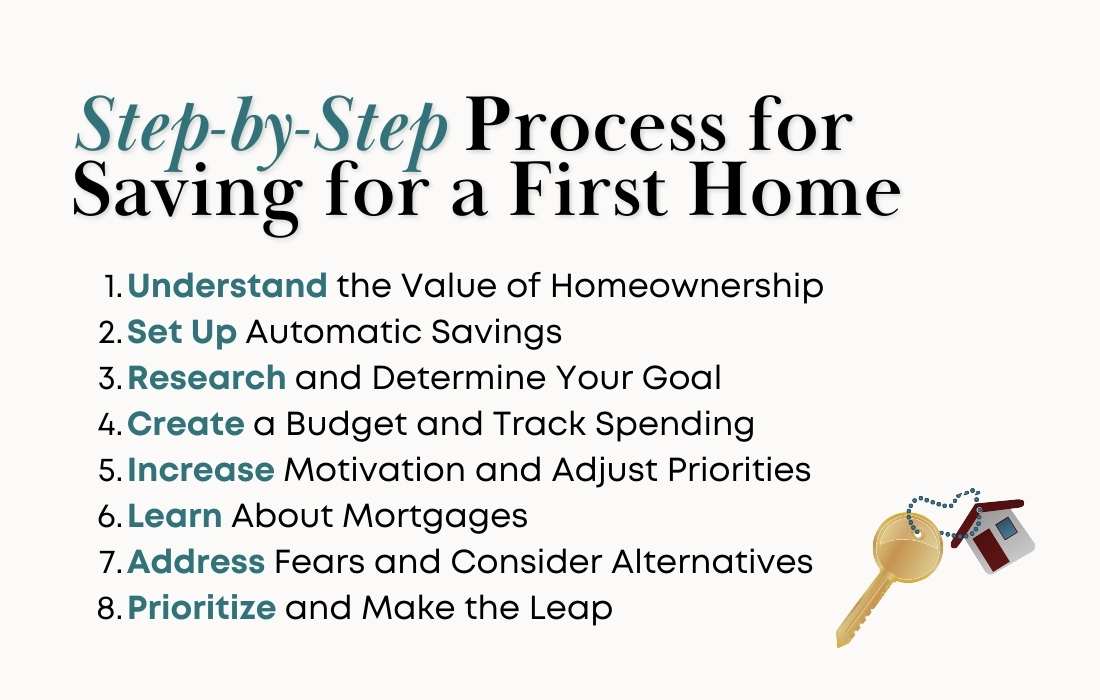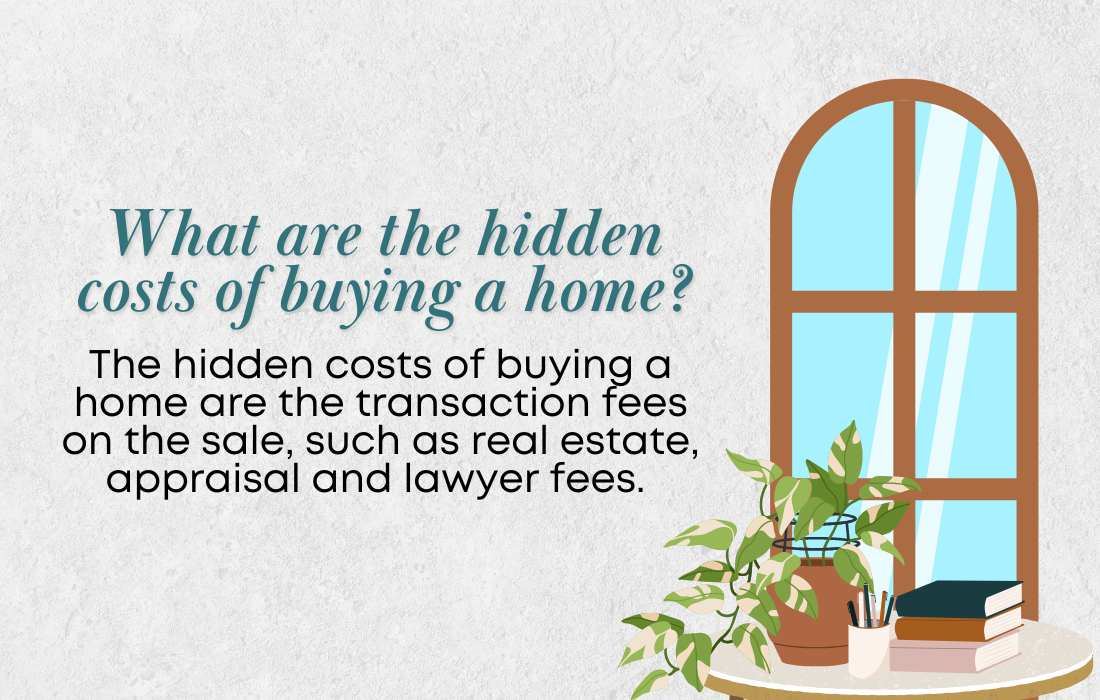Q: “Are there any money-saving secrets when buying a home?”
The most important money-saving secret for anyone buying a home is to master your money mindset and make strategic decisions. I this post, I’ll share how I saved up for my first home, provide a step-by-step savings plan, and go over common questions about buying a home. So if you’re on the path to buying your first home, this is for you!
Written By Tiffany Woodfield, Financial Coach, TEP®, CRPC®, CIM®

How I Saved Money When Buying a Home
I grew up in a real estate family.
My parents were both real estate agents, and my two sisters later became real estate agents as well. So, buying a home was frequently discussed at the dinner table when I was a kid.
Aside from the golden rule of “buy the worst house on the best street,” I didn’t have concrete strategies to save for my first home. But I understood that investing in a home — especially as your principal residence — can be a great saving strategy.
Instead of spending money on that extra dinner out, you can invest money in your home.
When you go to sell, if the house increases in value, the proceeds are taxed more favourably than many investments.
So what did I do to save for my first home?
I set up automatic savings so that a part of every paycheque went into a separate account for a downpayment on my first townhouse. I looked at the areas I liked and figured out how much a starter place would cost.
Once I had a clear goal and knew the purchase price, I created a budget for saving more each month. And I also got clear on where my money went each month.
After doing this exercise, I was surprised to discover that I wouldn’t be paying much more for a mortgage than for rent.
This discovery motivated me to save even more and to take the leap and go to the bank to find out about mortgages. I probably should have done this earlier, but I was really afraid of being “locked in” to a mortgage.
What if I wanted to travel, or what if I lost my job? The thing is that change is scary, and getting your first mortgage is a big change.
Once I accepted this, I realized I could still travel and rent out my place if I lost my job. Or I could get a roommate.
Just getting clear on what I was spending, how much the down payment would cost, and what I wanted forced me to prioritize my spending.
Okay, so now that I’ve shared my story, let’s turn what I did into some actionable steps.
Here’s the step-by-step guide to saving for your home following my path.
Step-by-Step Process for Saving for a First Home
- Understand the Value of Homeownership:
- Recognize that investing in a home, especially as your principal residence, can be a strategic financial decision.
- Acknowledge that homeownership often offers favourable tax treatment compared to other investments.
- Set Up Automatic Savings:
- Create a separate savings account dedicated to your home down payment.
- Arrange for automatic transfers from each paycheck to this account to ensure consistent savings.
- Research and Determine Your Goal:
- Identify the areas you prefer and research the cost of starter homes or townhouses in those neighbourhoods.
- Establish a clear savings goal based on the purchase price of homes in your desired area and what percentage you’d like to put down on the home.
- Create a Budget and Track Spending:
- Analyze your current monthly expenses to understand where your money goes.
- Develop a budget outlining how to save more each month towards your down payment.
- Compare your current rent to potential mortgage payments to see the financial differences.
- Increase Motivation and Adjust Priorities:
- Use the insight from your budget to motivate yourself to save more aggressively.
- Prioritize your spending by cutting unnecessary expenses, such as dining out, and redirecting those funds towards your down payment savings.
- Learn About Mortgages:
- Educate yourself about the mortgage process, including different types of mortgages, interest rates, and terms.
- Schedule a meeting with a bank or mortgage advisor to explore your options and get pre-approved for a mortgage.
- Address Fears and Consider Alternatives:
- Acknowledge any fears about being “locked in” to a mortgage. What are your fears?
- To mitigate these concerns, devise contingency plans based on potential future problems, such as renting out your home or getting a roommate.
- Prioritize and Make the Leap:
- Once you clearly understand your spending, savings goal, and mortgage options, prioritize homeownership as a key financial goal.
- Take the necessary steps to secure financing and purchase your first home.
Following these steps will prepare you to save for and purchase your first home, ensuring a strategic and well-planned approach to homeownership.

Common Questions about Buying a Home
How can I determine my budget for buying a home?
Some of the ways to determine your budget for buying a home are as follows:
- Your mortgage payments shouldn’t exceed 28% of your gross monthly income. The FHA recommends that it shouldn’t be more than 31% of your gross monthly income.
- Your budget is how much the lender is willing to give you. Following this strategy has its drawbacks because you may end up struggling to make your monthly payments.
- Calculate how much money you spend monthly on housing and use this number.
- Create your own budget using your income, expenses and current obligations to determine how much you can afford.
To get started, I recommend researching and using free online mortgage calculators to help determine how much your mortgage payments will be each month based on your purchase price, the amount of your downpayment, and the interest rate.
What are the hidden costs of buying a home?
The hidden costs of buying a home are the transaction fees on the sale, such as real estate, appraisal and lawyer fees. Ongoing costs people need to budget for include homeowner insurance, property taxes, utilities, and repairs.

Is it better to buy a new home or an older property?
The benefit of a new home is you are less likely to be suddenly dealing with a major repair, such as replacing a roof.
But you also pay more for this peace of mind. Buying an older property can be an opportunity, especially if you’re handy and willing to do some work yourself.
However, be sure you’re not taking on something more than you can handle.
In addition, do your research to find out if buying in the best neighbourhood in your city actually makes sense financially. Research from Zillow indicates that this may not always be the best strategy if you want to see your home value go up. At the end of the day, you have to do what’s right for you and your family.
How do I negotiate the best purchase price?
To negotiate the best purchase price, research what homes are selling for in your area, work with an experienced real estate professional and keep your emotions in check. You must prepare yourself to walk away if a homeowner doesn’t budge on the price.
What should I look for in a mortgage?
Some of the most common things to look for in a mortgage are the following:
- Term: The length of your mortgage contract and when you need to renew.
- Interest Rate and whether it is fixed or variable.
- Amortization period: The length of time to pay off a mortgage in full
- Open or Closed Mortgage: If it is open, you have more flexibility if you want to make extra payments.
- Portability: A portable mortgage allows a homeowner to transfer their existing mortgage from one property to another if they decide to move. The homeowner can take their current mortgage terms, including the interest rate, balance, and remaining term, and apply them to a new property purchase.
Can I save money by skipping a home inspection?
You definitely can save money by skipping a home inspection, but it can have costly consequences, and I wouldn’t recommend it! It’s not wise to save money in the short term to risk losing money in the long term.
How much should I save for a down payment?
Without a minimum downpayment of 20%, you will likely need to buy mortgage loan insurance, and the mortgage will cost you more because you are a greater risk to the lending institution. Thus, it makes sense to save 20% for your down payment.
Summary of Key Points:
- Homeownership, especially as your principal residence, can be a strategic financial move with favourable tax benefits.
- Set up automatic savings transfers to a dedicated account for your down payment, ensuring consistent contributions.
- Analyze monthly expenses, create a budget, and prioritize spending to increase savings for your home purchase.
- Learn about mortgages, meet with advisors, and get pre-approved to understand your financing options and requirements.
- Acknowledge fears about mortgages and develop contingency plans like renting out your home or getting a roommate to mitigate risks.
Get the Free Guide and Audio Meditation for Manifesting Your Dreams
Pop your email address in the form below to get my easy checklist and guide to manifesting and the guided audio meditation to help you get started.
You’ll also get one or two emails per month with the latest blog posts about abundance, wealth-building, manifesting, and creating a fulfilling life.
Related Articles
💎 How To Become Good at Saving Money
💎 Money Management Rules: 50-30-20, 7-Day Rule, and 20/10 Rule
💎 How To Get Your Mind in the Mindset of Saving Money
About the Author

TIFFANY WOODFIELD is a financial coach, cross-border expert, and the co-founder of SWAN Wealth based out of Kelowna, BC. As a TEP and associate portfolio manager, Tiffany has extensive experience working with successful professionals who want to leave a legacy and enjoy an adventurous, work-optional lifestyle. Tiffany combines extensive knowledge from her background as a financial professional with coaching and her passion for personal development to help her clients create a unique path that allows them to live their fullest potential. Tiffany has been a regular contributor to Bloomberg TV and has been interviewed by national and international publications, including the Globe and Mail and Barron’s.